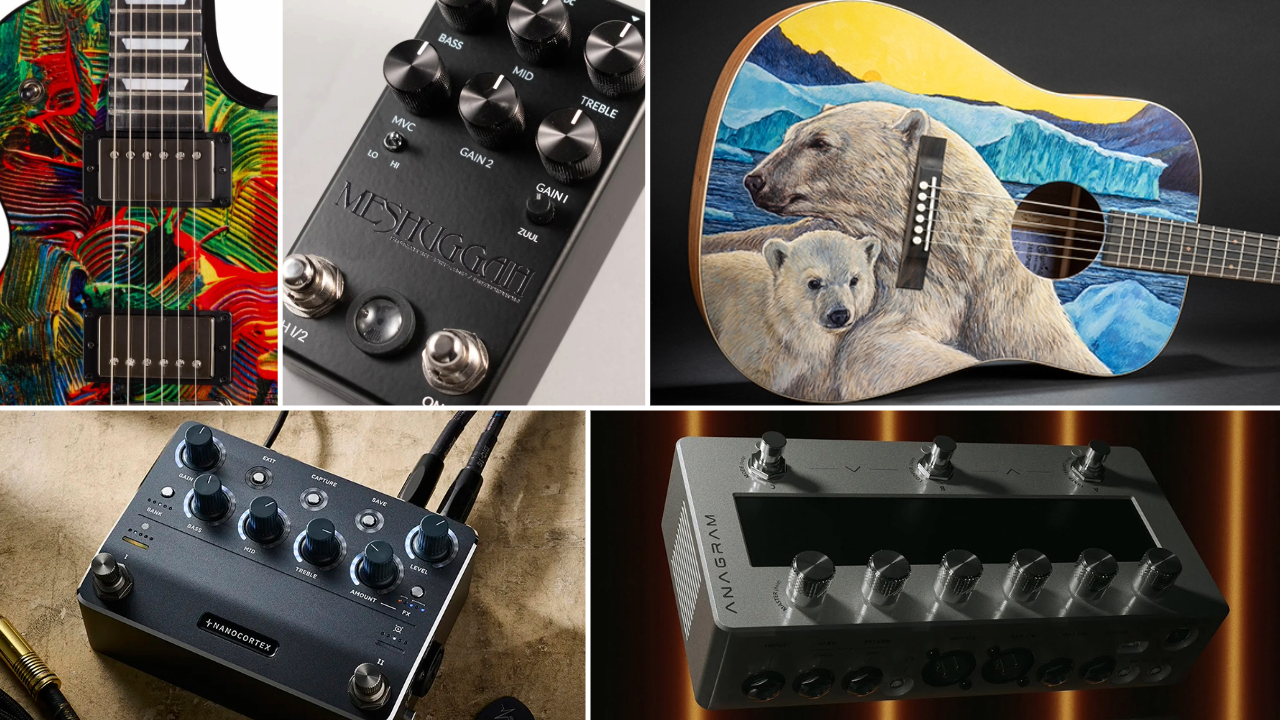Prince: requiem for a bass hero
The bassists that played with the late legend share their stories
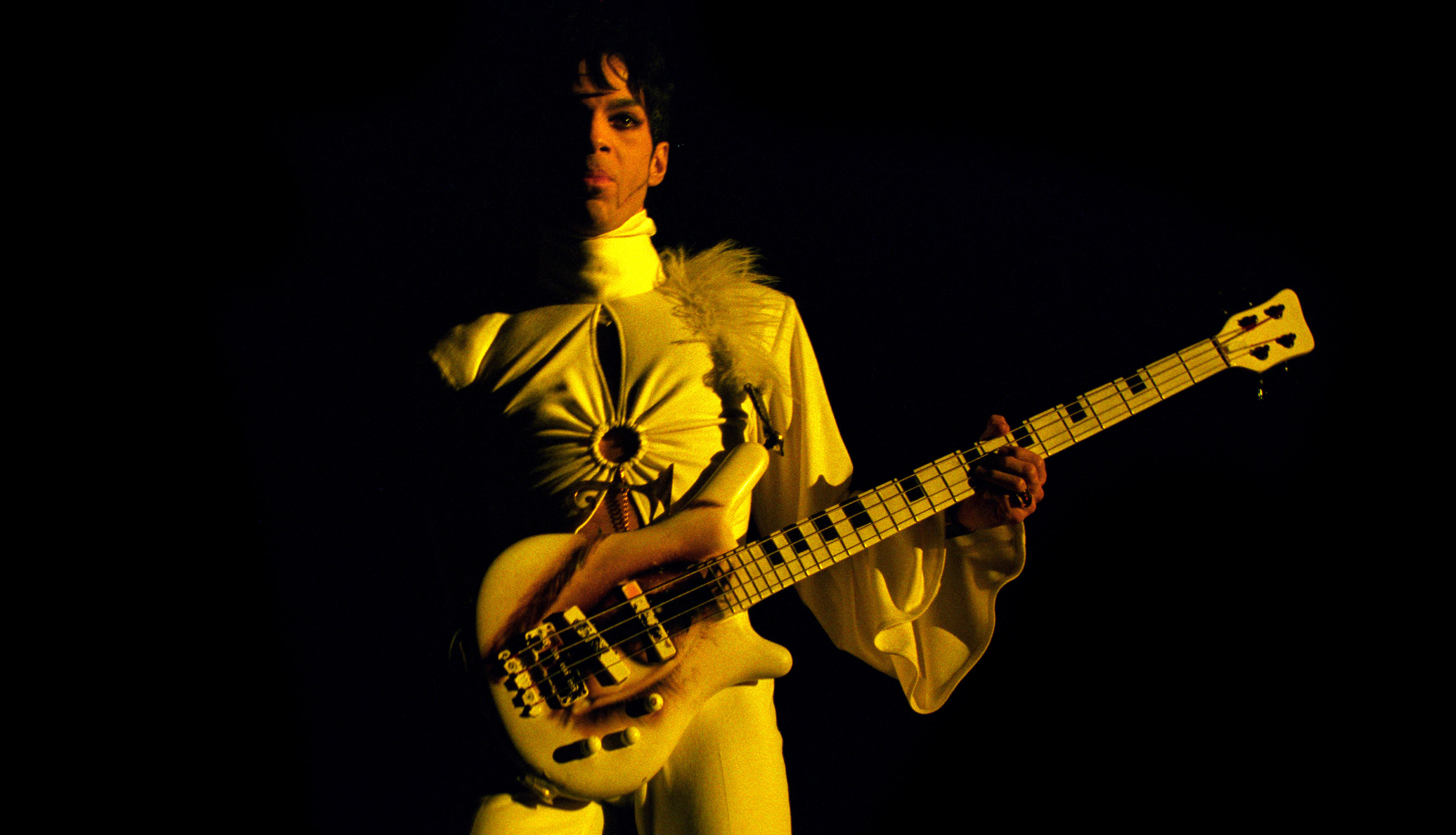
As a masterful polymath - a brilliant songwriter, stunning singer, riveting performer, gifted drummer, innovative programmer, jaw-dropping guitarist, prolific producer, and exceptional keyboardist - Prince was without equal. He was a fascinating composite who transcended his influences, the rare artist who also excelled in business, and a limitless fountain of grooves and ideas.
It should be no surprise, then, that Prince was also one of the great electric bass magicians of the last 40 years. On his first album, 1978’s For You, Prince showed that he had already absorbed the innovations of Stanley Clarke, Louis Johnson, and Jaco Pastorius.
Before long, Prince had developed a signature style that owed much to his hero, Larry Graham, while also being indebted to the stellar bassists with whom he had grown up, especially Sonny Thompson. (Prince also knew when to leave out the bass for maximum impact, as he did on gems like Something In The Water (Does Not Compute), Kiss, and When Doves Cry).
Throughout his career, as he switched between being an exacting bandleader and a dazzling, one-man studio band, Prince put a premium on the role of bass in his music, bringing out the best in the superb musicians he hired and continuing to lay down killer low end live and in the studio.
In honor of his contributions to our instrument, we gathered a virtual roundtable of bassists who played with Prince during his lifetime. Several, including Thompson, André Cymone, BrownMark, Levi Seacer Jr, Rhonda Smith, Ida Nielsen, Andrew Gouche, and Josh Dunham (as well as drummer John Blackwell and bass/guitar tech Takumi) toured and recorded with him for years.
Some, like Tal Wilkenfeld and MonoNeon, spent brief, intense periods at Paisley Park, while others, like Alex Al, jammed with Prince but never made it to his studio. All, however, were touched by his magic and inspired by his presence.
These are their stories.
Get The Pick Newsletter
All the latest guitar news, interviews, lessons, reviews, deals and more, direct to your inbox!
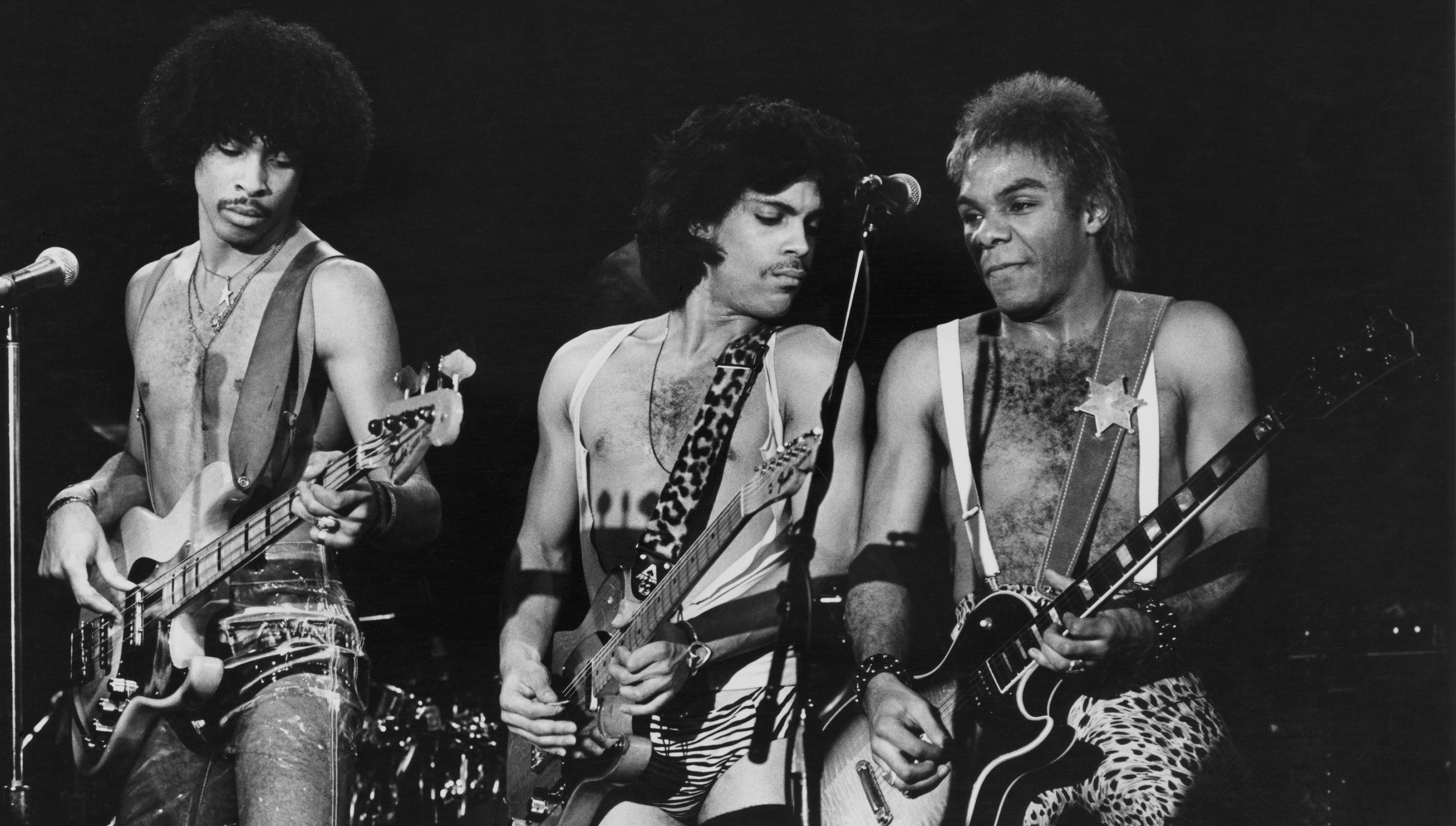
André Cymone (worked with Prince from 1979– 81): "I met him on my first day of high school. I played saxophone, but I also knew how to play bass. Prince told me he played keyboard, and we hit it off, so he took me to his house, where we started jamming.
"We didn’t know it when we first met, but our fathers had played together - his dad played keyboards and my dad played bass. We decided to start a band, and we called ourselves Grand Central.
"A kid in our neighborhood put bass strings on an old Teisco Del Rey guitar, and he would let me use it for band practice. Eventually, my mom saw how serious I was, so she bought me a Sears-catalog bass, and then the band chipped in and I got a Fender Jazz.
"For the first few years, we were all just trying to master our instruments, but then Prince would be like, Can I play your bass? And I would ask if I could play his guitar. He would show me a few things on guitar, and I would show him stuff."
Sonny Thompson (1990–2009): "Prince and André had Grand Central, I had my band called the Family, and Terry Lewis had Flyte Tyme. Grand Central played Grand Funk Railroad, Graham Central Station, and a wide range of stuff. We were into Parliament–Funkadelic and Sly & the Family Stone. Flyte Tyme was the party band."
Cymone: "Sonny Thompson was one of our idols. I remember standing on the side of the stage watching the Family, and they were amazing. That’s what we wanted to be."
Thompson: "Prince, André, and I grew up together, but I didn’t realize Prince played bass until he came over to my house one day. We were down in the basement, where I had all the equipment set up, and we were playing around.
"He was cold on the drums! When he picked up bass, he was trying to match it, and I said, “Hold on, let me show you something, man.” I taught him a lot about bass, guitar, and using his falsetto."
I would go out into the audience and listen to the band when he sat in on bass. That dude was a monster!
BrownMark
BrownMark (1981–86): "I was in a band called Fantasy, and when the Family disbanded, their lead singer, Randy Barber, came over to Fantasy. Sonny T. would show up at our gigs, and we would invite him up. I would go out into the audience and listen to the band when he sat in on bass. That dude was a monster!"
Takumi (Prince's former bass/guitar tech 1997–2006) "The biggest bass influence on Prince was Sonny T.; he would say that over and over. And Larry Graham, of course, who was like a father figure."
BrownMark: "Prince would come see me play around town. One day he called and asked me to audition for his band. I’m thinking to myself, Sonny is the baddest bass player in town - why are you calling me? I think it was because Sonny was older, doing his own thing already, but I had just turned 19 and was moldable.
"At rehearsals, Prince would drive me really hard. The fear that I wasn’t gonna make the cut drove me to a whole different level of playing. A lot of times, I would give him my bass and say, “Show me how you would do this,” and he would."
Josh Dunham (2005–10): "I once asked Prince if he would show me some stuff on bass, and he was like, “No,” and he walked out [laughs]. But he would come to rehearsal and say, “Let me see the bass,” and that would be his way of sharing his ideas and approach to playing."
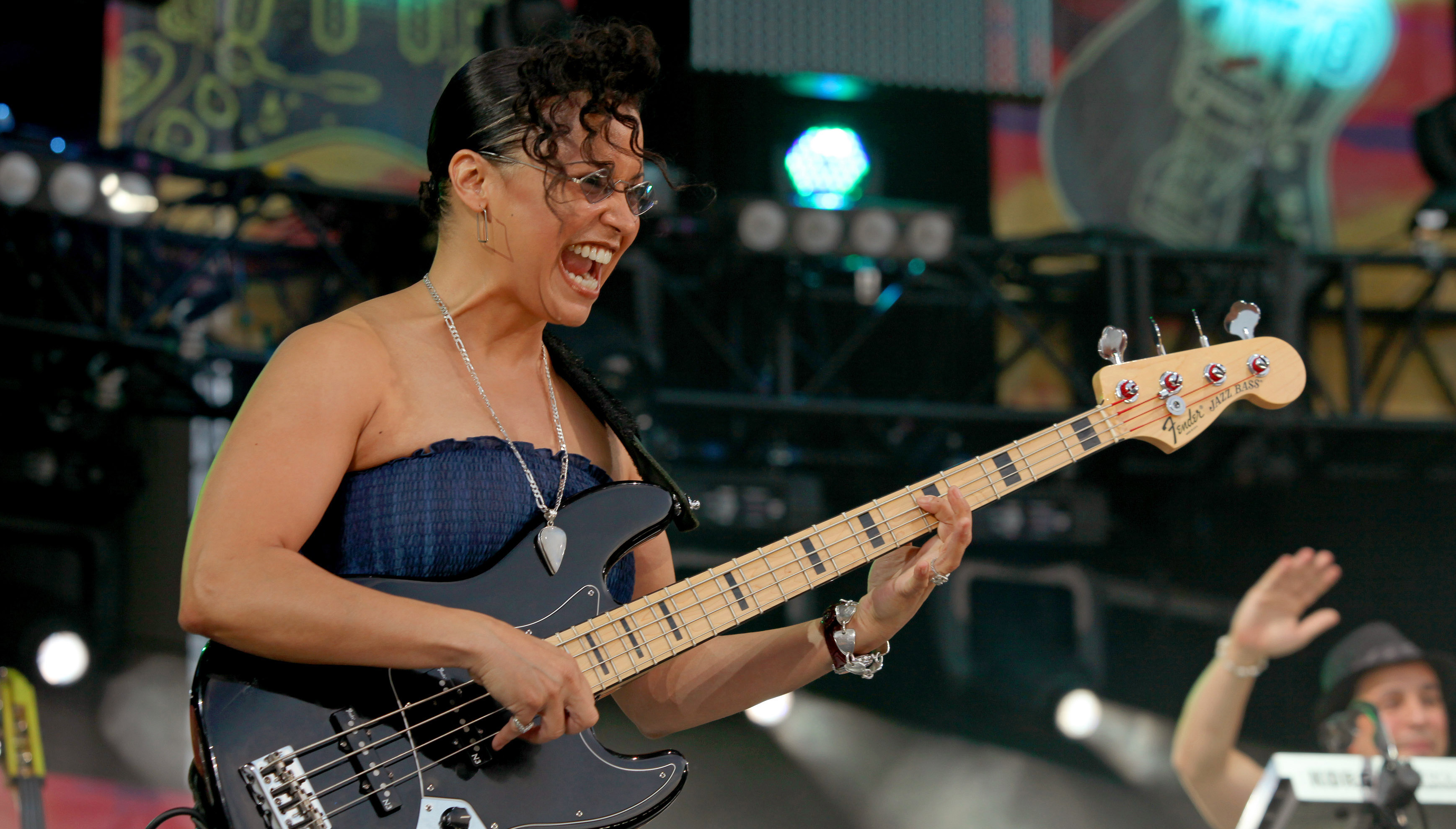
Rhonda Smith (1996–2009) "And you’d better get it quickly, because by the time it came out of his mouth, he had already moved on to the next idea."
Dunham: "When he’s playin’, you better be catchin’ it!"
BrownMark: "Prince taught us to play really hard, because that aggressiveness comes out in the music. Our styles were so similar, and when I got with him, I absorbed what he knew about bass."
John Blackwell (2000–13): "Prince was one of the funkiest bass players ever, and BrownMark was the only one who could mimic everything Prince did. On tracks like “Pop Life,” I can’t tell whether it’s Brown or Prince."
BrownMark: "I understood Prince’s style so well that it fit like a glove. And after we recorded, he’d go in and change things, so a lot of times, I didn’t know if it was me or him."
Smith: "When I first heard his bass tone, it had more midrange than I was used to. Of course, it was appealing, and I was in awe."
"The bass is a big part of Prince’s sound, and that’s because 98 percent of it is him playing bass"
Rhonda Smith
Dunham: "Prince was serious about getting that tone right. One day he asked me, “Why are you using the bass [knobs] on the amp and on the bass? Don’t you just need one?” So then I started putting the bass on my amp on zero and controlling my tone from the bass guitar. I heard all the low notes, but it wasn’t boomy, especially when we played big stadiums. It made so much sense."
Smith: "The bass is a big part of Prince’s sound, and that’s because 98 percent of it is him playing bass. To play with him, you gotta be able to emulate his style. And he preferred that bass players use 4-strings.
Dunham: "When I started with him, I had my Zamar 5-string, but he wanted me to play a 4. I stuck with my bass as long as I could, but then I realized that he was right. You can’t get that tone anywhere else.
Andrew Gouche (2011–14): "I tried to get him to play my bass, but he wouldn’t touch it because it was a 6-string. When I first joined the band, he joked, “Why you gotta have all those strings? Larry’s bass only has four strings.” And I told him, “Well, this bass has those four strings on it, too.” But when I hit him with that low Bb in Purple Rain - I tune my 6 down a whole-step - he turned around and looked at me like, “Ooooh, damn!” He loved it."
Levi Seacer Jr. (1987–91): "Guitar is my main instrument, but Prince taught me how to be a bass player. At first, it was hard for me because I was used to guitar solos, but I had to hold it down - I was part of the foundation of the house. A lot of players want to be Stanley Clarke or Marcus Miller, but that had no place in our band. Unless Prince gave you a solo."
Gouche: "He was very specific about what he wanted, especially on his hit songs, but everyone got a chance to shine. He would turn around, point to you and say, “Go!”"
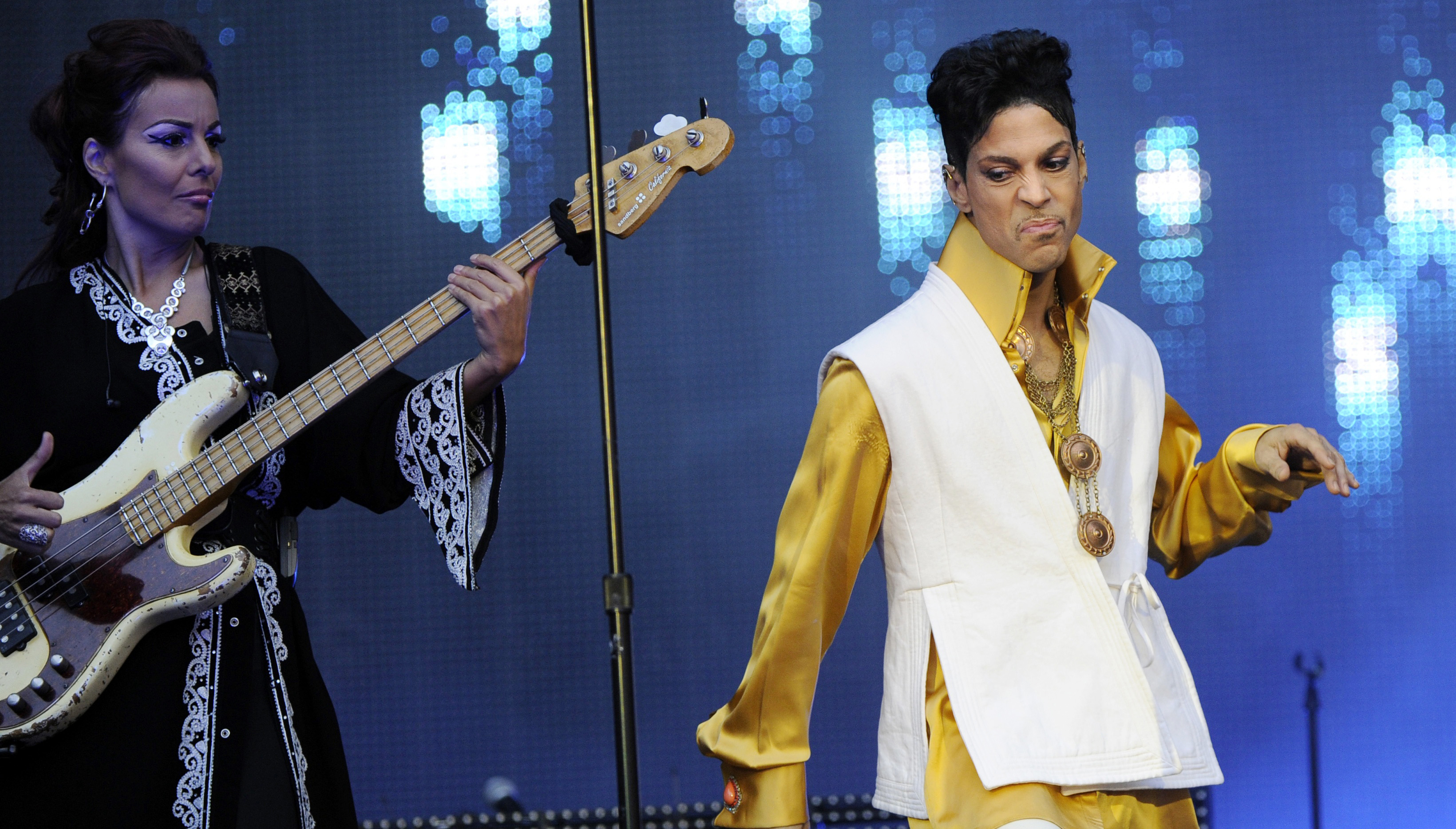
Seacer: "In rehearsals, the bass player stood next to the hi-hat, and the pocket was supposed to be a little behind the drummer, so you get that funky drag. The guitar player was kind of in-between those two, and the keyboard was on top, adding colors. Prince was a stickler for the instruments staying in their areas. And he didn’t mind looping a part until it felt right."
Smith: "I call Prince’s bass technique “dirty funk” because there was a sloppiness to the way that he played, and that’s what gave him his sound. It’s meatier, dirtier, and fuller. It’s a feel thing."
Tal Wilkenfeld (2009–10): "At one point, Prince played my Sadowsky 4-string, and it sounded like a completely different instrument. It reinforced my belief that tone is in your fingers. I was inspired by his unique and powerful sound."
Ida Nielsen (2010–16): "What stands out to me is the rhythm and space in his bass lines. He didn’t like ghost-notes, so you had to play everything super clean, which created that clean and tight sound."
Gouche: "He hated ghost-notes. I’m used to tapping my strings to keep time, almost like hitting the backbeat in-between what I’m playing, but with him, I had to learn how to not do that."
I never heard anyone who could be so funky with a pick as Prince
Ida Nielsen
Smith: "Part of Prince’s style is the magic of what’s not there, of not filling up every possible space with a bass line, pulse note, pluck, or whatever."
Dunham: "One time he showed me this groove where he was playing one note, with his thumb. It was so funky and hard. Just that one note!"
Nielsen: "And I never heard anyone who could be so funky with a pick as Prince."
Smith: "He used a pick very well as a bass player. When I first met him, he asked me if I could play with one."
Nielsen: "What I call the signature Prince style is a really tight bass line with not much happening except a single pluck once in a while, which would always come in the exact right spot and be super funky."
Seacer: "It’s a very distinct Minneapolis style of bass, a thing we call “rumbling.” You keep a lot of rhythm, and you hit a note every now and then. If you listen to what Prince played on A Love Bizarre, there are very few notes, but the funk is in the rumbling of the string."
Gouche: "His bass style was really tied to the kick, snare, and hi-hat. Everything hittin’ on the one was always important to him."
Thompson: "More than anything, the Minneapolis style is about note placement. Dynamics and rhythm, and playing tight, are the most important things."
Smith: "With songs like “777-9311” or “Let’s Work,” it’s so important to respect the bass lines and learn what they are before you embellish."
Dunham: "I would play whatever he wanted, and he was open to me adding little stuff, if it fit."
Alex Al: "I worked with Sheila E a lot early in my career, which was an honor, and Prince would sometimes be around for our gigs.
"If you were playing something he produced and especially played bass on, you’d better know your parts - end of story. Prince would take your instrument and show you the part, and it would be both fierce and enlightening at the same time!"
Gouche: "The first time he called Let’s Work, I got four bars in before he stopped the band and said to me, “Listen - if you’re gonna play my music, at least learn it!” [Laughs.] That made me work harder, because I always want to give people’s music the same respect I’d want them to give my music."
Smith: "When I first met him, I didn’t know his style that well. Luckily, he had enough faith to know that whatever he could show me, I could learn. He was a great teacher."
Wilkenfeld: "When we were recording, he gave me the freedom to express my own voice on his songs, rather than spelling out how or what he wanted me to play. On quite a few of the tracks, he created a framework for my bass playing to complement what he was doing, almost as a secondary vocalist.
"He’d point to me and say, “Bass solo!” or, “Play a bass melody!” I felt honored and privileged that he wasn’t looking for me to be a carbon copy of him."
MonoNeon (2015–16): "Prince allowed me to be myself. He saw my colors, saw the sock on my bass, heard the way I played, and simply welcomed me into his world. He gave me a chance without a compromise.
Nielsen: "Sometimes he would just let me do my thing, and other times it had to be exactly as on the record. If there was a new song or arrangement, he would either sing the line to me or take my bass and show me."
Gouche: "The first day I got to Paisley Park, I said, “Whatever you want me to do, just let me know.” His exact words to me were, “Do your thing, and if I want something specific, I’ll tell you.” And he did."
Smith The first time we did “777-9311,” he played the bass line to show me how it went. I had already heard that he was on the original, but when he played it, I knew for sure. That’s one of my favorite Prince bass lines."
Thompson: "I love Alphabet Street. That bass part is dope! There’s so many songs where the bass is cold-blooded, like America, She’s Always in My Hair, and Let’s Work.
Dunham: “Let’s Work!”
Seacer: "When we were putting together the Lovesexy tour, I was playing Alphabet Street in rehearsal, and Prince said, “You’ve got about 70 percent of it. Go to the studio, pull up the multitrack, and really listen to it.” When I soloed the bass and drums, I was like, “Oh my god!”"
Nielson: "There are so many cool Prince bass lines, but my favorite is definitely Alphabet Street. It has so many amazing fills and licks that it’s almost a solo, but it doesn’t disturb the flow of the song. Incredibly funky!
MonoNeon I’ve always loved the bass line on “D.M.S.R.”
Blackwell: "One of my favorite parts to play with Prince was The Everlasting Now, from Rainbow Children. And Ballad of Dorothy Parker from Sign O the Times, Let’s Work, Head from Dirty Mind, and What Do U Want Me 2 Do from Musicology."
BrownMark: "I love Lady Cab Driver. That was just us being carefree and feeling that beat."
Nielsen: "We would never use a click, because Prince preferred the human feel. The recordings we did with 3rdEyeGirl were all live and in the same room, so we could not overdub. It definitely kept us on our toes."
Wilkenfeld: "He was the first person I recorded to tape with, and he was not a fan of punching in. Occasionally, you’d be lucky to get one chance. That experience taught me to commit to whatever I’m playing at any given moment."
Playing with Prince taught me how to embrace the moment, the now, when playing my bass
MonoNeon
MonoNeon: "The one thing I learned from Prince just by watching him work is how to be confident with your ideas and move forward without shame. Overall, playing with Prince taught me how to embrace the moment, the now, when playing my bass."
BrownMark: "Prince taught me how to think outside the box. He’d say, “Don’t look at what everybody else is doing, Mark. How would you do it? Own it!” So that’s what I started doing, and he liked it."
Wilkenfeld: "He sat me down and talked to me for three hours about why I shouldn’t sign to a record label that was pursuing me. He didn’t want my music to be compromised or anything but creatively driven."
Alex Al: "Prince and I always talked about the business. He wanted me to know that it wasn’t enough for me to play bass on other people’s records. He believed in my skills beyond the bass, which meant a lot to me.
"Musically, he was our John Lennon, our Mozart, yet he was original. He was a constant well of musical information."
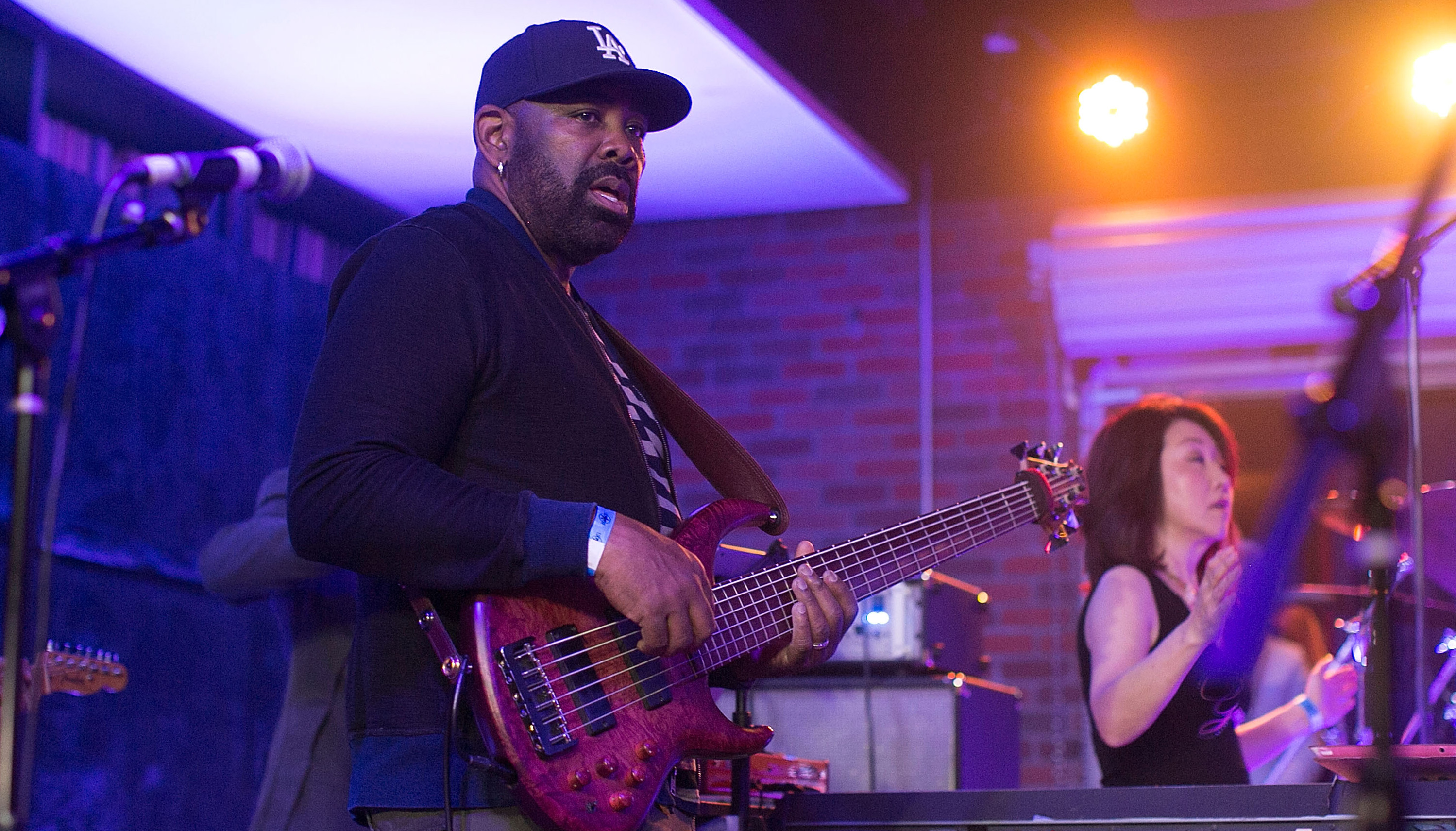
Gouche: "I've worked with everyone, and he’s the baddest dude that I’ve ever been around. When I saw his demand for excellence and his work ethic, that’s when I became a fan. He accepted nothing less than perfection, 24/7."
Cymone: "We had a take-no-prisoners attitude about the way we approached playing, performing, and being musicians. We were ferocious. That’s one thing I will miss - somebody I knew who shared that attitude."
Nielsen: "He always gave 100 percent of himself. He loved playing music so much, and you could absolutely feel that! A song like Purple Rain, which he must have played so many times, was always deeply felt and magical. And to us musicians, too.
Dunham: "Every time he took a solo, it was like hearing him for the first time. It was fresh. He taught me that there are no limits."
Nielsen: "Everything is possible. He would push all of us beyond what we thought our abilities were. And he taught me how to play guitar!"
Gouche: "Prince would just throw you in the fire. Ida didn’t play guitar before she got in the band, but I watched her become really proficient."
Seacer: "He wanted everyone to be creative and do the best they could. I’m trying to keep the music moving forward, because that’s what Prince would have wanted."
Prince was a perfectionist in a world where perfection doesn’t exist
Rhonda Smith
Alex Al: "The last time I spoke with him was so intense. It was about letting go of past musical and business accomplishments in order to forge ahead and embrace the future of music - what it’s going to sound like, and how we’re going to contribute to it.
"I’m eternally grateful for how he inspired me on bass and what he taught me about the corporate boardroom of the music business. He was the ultimate mentor to me. I will miss him dearly."
Nielsen: "I earned so much from him. He was a genius and such an unbelievably gifted musician. And I feel so lucky to have been on the front row and seen him work. I will do my best to honor him by keeping the level high."
Thompson: "The last time I saw him, at Bunker’s in Minneapolis, I told him, “Man, I love you till the end of time.” He said, “I love you, too, Sonny.” That was the last thing I got to say to him. When I found out he died, I couldn’t do anything for two weeks. It’s still so hard. But I’ve got to move forward."
Smith: "Being a member of the New Power Generation was like going to the Special Forces, as opposed to the regular Army, Navy, or the Marines.
"Prince was a perfectionist in a world where perfection doesn’t exist. He was an amazing cat, and I’m so blessed that I got to work with him. My heart is forever broken by his loss."
Takumi: “He was a great bass player. People don’t give him credit because they didn’t get to see him play that much, but now that he’s gone, I’m sure you’ll see a lot more videos of Prince killing it on bass on YouTube.”
Bass Player is the world’s most comprehensive, trusted and insightful bass publication for passionate bassists and active musicians of all ages. Whatever your ability, BP has the interviews, reviews and lessons that will make you a better bass player. We go behind the scenes with bass manufacturers, ask a stellar crew of bass players for their advice, and bring you insights into pretty much every style of bass playing that exists, from reggae to jazz to metal and beyond. The gear we review ranges from the affordable to the upmarket and we maximise the opportunity to evolve our playing with the best teachers on the planet.
“I was playing stuff I don’t think James Brown understood. He told me, ‘You have to play the one – you’re playing too much’”: Six years after he quit touring, Bootsy Collins reflects on James Brown and George Clinton, and what he gets out of playing today
“When I first heard his voice in my headphones, there was that moment of, ‘My God! I’m recording with David Bowie!’” Bassist Tim Lefebvre on the making of David Bowie's Lazarus








![[from left] George Harrison with his Gretsch Country Gentleman, Norman Harris of Norman's Rare Guitars holds a gold-top Les Paul, John Fogerty with his legendary 1969 Rickenbacker](https://cdn.mos.cms.futurecdn.net/TuH3nuhn9etqjdn5sy4ntW.jpg)


